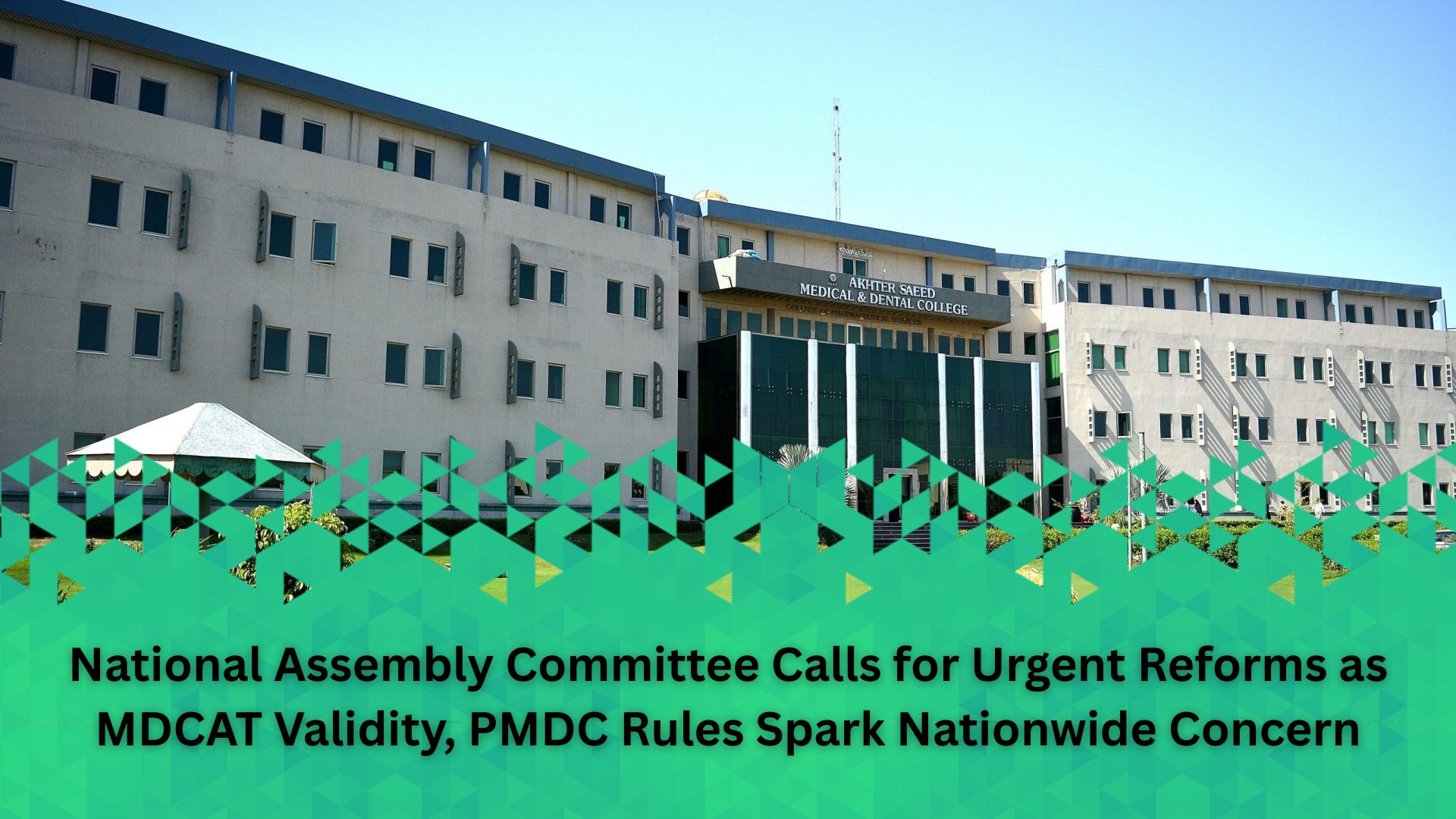
National Assembly Committee Calls for Urgent Reforms as MDCAT Validity, PMDC Rules Spark Nationwide Concern
The National Assembly Standing Committee on National Health Services, Regulations and Coordination on Thursday urged the government to introduce immediate reforms to resolve growing concerns surrounding the Medical and Dental College Admission Test (MDCAT), PMDC regulations, and governance issues in key health bodies. The meeting, chaired by MNA Mahesh Kumar Malani, brought several critical matters to the forefront, including MDCAT result validity, rising vacant seats in medical programs, IBCC equivalency disputes, and administrative challenges within the Pakistan Nursing and Midwifery Council (PNMC).
MDCAT Validity Under Fire as Lawmakers Seek Uniform Policy
A major highlight of the meeting was the intense debate over the three-year validity of MDCAT results, a policy that has faced criticism from students, parents, and institutions. Committee members argued that MDCAT scores from different years cannot be compared fairly due to varying levels of exam difficulty, changes in the syllabus, and inconsistencies in testing standards.
Lawmakers warned that accepting MDCAT scores from multiple years creates an uneven playing field, disadvantaging students who appeared in tougher exam cycles. They stressed that the system must ensure fairness, transparency, and equal opportunity for all aspiring medical students.
Responding to the concerns, the Health Minister acknowledged the issues but clarified that the current admission cycle cannot be altered. However, he assured committee members that the government would consider legislative changes in line with the recommendations presented in the meeting. He added that maintaining the integrity of medical education is a national priority and that comprehensive solutions will be drafted soon.
Vacant Seats in MBBS and BDS Rise as Committee Recommends New Enrollment Controls
The committee also reviewed the alarming increase in vacant MBBS and BDS seats across various institutions in the country. Officials noted that many seats remained unfilled due to students frequently shifting disciplines or transferring between colleges after securing admissions.
Members proposed several solutions, including:
- Banning inter-college transfers to prevent seat wastage
- Improving waiting list procedures to fill seats more efficiently
- Introducing transparent admission timelines to avoid unnecessary delays
The Health Minister expressed grave concern over the seat wastage and directed the Pakistan Medical and Dental Council (PMDC), Law Division, and vice chancellors of public universities to prepare a legally vetted plan within two days. The plan must offer a permanent mechanism to prevent future losses of medical education seats, which ultimately harm the national healthcare workforce.
IBCC Equivalency Issues Raise Alarms for Cambridge Students
Another major area of discussion was the long-standing controversy surrounding the Inter-Board Committee of Chairmen (IBCC) and its equivalency formulas. The committee highlighted that thousands of students from the Cambridge international system experience major disadvantages due to current conversion practices that often reduce their marks compared to local board students.
MNA Mahesh Kumar Malani instructed committee members to personally engage with IBCC and develop a fair, transparent, and internationally aligned equivalency formula. He stressed that no student should be penalized for studying in a different system, especially when many seek admission to competitive fields like medicine and dentistry.
Experts noted that repeated complaints regarding conversion errors and inconsistent formulas have increased over the years, creating additional barriers for high-achieving students.
Governance Flaws in PNMC Spark Debate: Immediate Reforms Ordered
The committee also addressed serious administrative irregularities within the Pakistan Nursing and Midwifery Council (PNMC). Members expressed concern over the continued involvement of Ms. Yasmin Azad, despite her removal being previously ordered. Lawmakers emphasized that failure to implement official directives reflects poorly on institutional governance.
In response, the Health Minister confirmed that the newly reconstituted PNMC will convene its first meeting next week. He further directed that all outstanding matters, including administrative reforms, must be resolved within one week to ensure the nursing sector functions properly and professionally.
Additional Matters: DRAP Oversight, Pharmacy Practices, TB Hospital Transfer
The meeting also touched on several supplementary issues important to the country’s healthcare governance:
- The committee reviewed oversight concerns related to the Drug Regulatory Authority of Pakistan (DRAP) and emphasized the need for stricter monitoring of pharmaceutical practices.
- Lawmakers discussed the increasing trend of pharmacy referral practices near federal hospitals, where unregulated recommendations may negatively affect patients.
- The government also briefed the panel on the transfer of the 200-bed TB Hospital to the Punjab government, a move expected to improve provincial management and operational efficiency.

Committee Pushes for Swift Action to Protect Students and Strengthen Health Governance
Concluding the session, the National Assembly Standing Committee stressed the need for swift and decisive reforms to restore confidence in the health education system. Members reiterated that issues such as MDCAT inconsistencies, vacant seats, unfair equivalency processes, and governance lapses must be addressed on priority to protect students’ futures and uphold the quality of healthcare in Pakistan.
The panel urged all relevant authorities including PMDC, IBCC, PNMC, and DRAP to work collaboratively and present actionable solutions before the next meeting. The committee also reaffirmed its commitment to ensuring transparency, fairness, and accountability across all health-related regulatory bodies.



.jpg)











